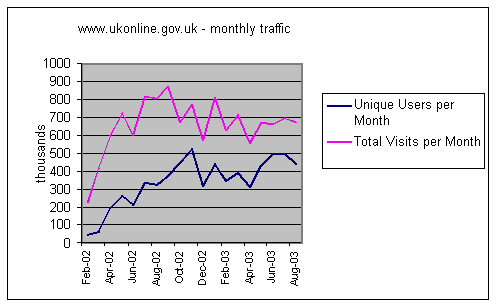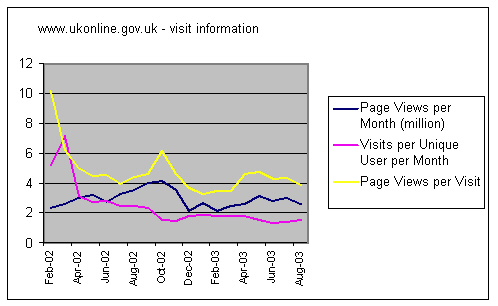Mailing Number 22 - 12 September 2003
117 subscribers on publication date
Please send
me feedback directly about these mailings, concerning content, design, or material
I ought to feature in the future. You can also send me anonymous feedback using the radio buttons at the bottom of this page. If you think others will find these mailings
useful or interesting, you can use this form to tell them.
| Site Home || Mailings Home ||
News/comment
| Resources |
Oddments |
Feedback |
News/comment
Sizing the Opportunity: The Quality and Extent of Online Education in the United States. A survey by Babson College and the Sloan Consortium [300 kB PDF] concludes that online learning in US tertiary institutions is at historically high levels and will continue to grow at a rate of nearly 20% per year. More controversially, ~75% of "academic leaders" questioned during the survey say that learning online is likely to be superior to face-to-face provision within the next three years.
UK Government web sites: some thick straws in the wind. The UK Government looks set to provide increased resources for government web sites and for two-way digital communications between government and citizens, and to shake things up in the Office of the e-Envoy (OeE). Evidence for this can be found in
- the 27/8/2003 Government Communications Review Group Interim Report [90 kB PDF], which contains the Government's interim thinking on how to improve the consistency, honesty, credibility, reliability, accuracy, and professional effectiveness of all government communications, and in
- the 6/5/2003 OeE evidence to the review group [600 kB PDF], which contains a clear critique of the quality, content, and organisation of Government web sites, as well as higlighting some of the admirable developments initiated by the OeE, for example its excellent
guidelines for UK government websites.
According to The Register responsibility for "ensuring effective e-communications" across government is to fall under a high-level 'Strategic Planning and Development function', reporting to a Permanent Secretary-rank civil servant, and in which the Office of the e-Envoy (OeE) will be intensively engaged prior to a new structure being put in place. Full article: e-Envoy prepares to log off.
These reports prompted me to discover how much traffic the flagship UKonline web site is actually getting. Raw data is available in "site traffic figures for www.ukonline.gov.uk" [33 kB DOC], but to interpret the data it required a bit of analysis. The graphs below summarise the situation.

Graph 1 - Useage. Monthly unique users (total visits) increasing from 44,000 (228,000) in February 2002, to 522,000 (872,000) in Autumn 2002, and then fluctuating at around 400,000 (675,000).

Graph 2 - Visitor behaviour. Total monthly page views increasing from 2.3 million in February 2002 to over 4 million in Autumn 2002, and then fluctuating at around 2-3 million. (UK use of the BBC web site is getting on for 100 times greater.) Note the steady drop in monthly visits per unique user from 7 to less than 2, and in page views per visit from 10 to 4, which shows that individual users are making decreasing use of the site; the reduction in page views per visit might mean that once a user arrives they tend to find what they want without having to browse.
University of California and Eolas Technologies win significant court case against Microsoft. Microsoft improperly put patented Web browser technology into its Internet Explorer, according to a verdict given on 11/8/2003 by a federal jury in the U.S. District Court in Chicago. The jury found that Microsoft had infringed a patent owned by the University of California and licensed by Eolas Technologies, and awarded the two $520.6 million in damages.
Last week a US federal judge rejected Microsoft's first attempt to get the Chicago judgement overturned, though more are planned. Though Microsoft is bullish about eventually winning an appeal against the original ruling, if it does not win, then the current way in which web browsers (including, potentially, Netscape, Mozilla, and Opera, as well as Internet Explorer) handle plug-in technologies, such as Macromedia Flash, Java applets and Adobe's Acrobat Reader, may have to be changed, thereby potentially forcing many (millions of?) web sites to make extensive changes to how they are designed.
Depending on your level of interest (if any!) in this issue, which highlights how potentially vulnerable the whole web is to patent claims, the following links provide background information.
Broadband Regional Aggregation Project. Several years ago the 8 further education colleges in South Yorkshire formed a consortium to jointly procure bandwidth, with several readers of this Fortnightly Mailing closely involved. As a consequence each South Yorkshire college, irrespective of location, achieved at least an adequate amount bandwidth, at a reasonable price, far sooner than was normal in the FE sector. For years there has been talk about aggregation of demand as a way of getting broadband connectivity into rural areas on a more general basis. This talk is now turning into action, with the Government:
-
setting up 9 Limited Liability Partnerships called Regional Aggregation Bodies (RABs);
-
initiating a public procurement excercise through the Official Journal of the European Union for service providers to establish Framework Agreements for the supply and/or management of aggregated broadband services to the UK Public Sector.
For fuller details, including an explanatory briefing document, and the Official Journal call, which closed on 11/9/2003, see the Broadband Regional Aggregation Project web site, and this article from The Register.
Wayback machine. Though it works slowly at certain times of day, and produces occasionaly hit anD miss results, the Wayback machine provides a useful (the only) way to find out what a web site looked like in its previous versions (and, more importantly, what an organisation used to say about itself), as these examples show:
"I will show you whether you like it or not that physics is beautiful". Sometimes I forget why I became so interested in online learning. Initiatives like MIT OCW remind me why. This time last year I featured the pilot MIT Open CourseWare site, which at that time hosted the learning materials from a small number of courses run at the Massachusetts Institute of Technology. Since then MIT OCW has grown a great deal, and is no longer a pilot site. Materials are now available for over 500 courses, covering a very wide range of subjects and levels, with resources available including video recordings of lectures, animations, document in PDF format, and software applications. Some of this content is suitable for able Level 3 learners in further education, as well as for its intended university-level audiences. Here are couple of examples.
- Argumentation and Communication - simple "handout" materials to support Writing in Professional Settings, Research Writing,
Communicating with the Public, Writing Executive Summaries, Making Oral Presentations, and Presenting Research Orally.
-
Physics - including videos of Walter Lewin's 36 superb 45 minute lectures (hence the title for this item) about electricity and magnetism, for first year undergraduates, as well as a large number of animations to convey key concepts in the electricity and magnetism topic.
MIT OCW is being implemented by a big team, and is seen by MIT as a 5 year project. All the content is published (like this Fortnightly Mailing...... ahem...) under a Creative Commons License, which permits the content to be copied, redistributed, and developed for non-commercial purposes.
Sign up for monthly updates from MIT OCW.
al.chem'i.cal. I hesitated whether to post details of David Jennings's recently launched web log as "News", and decided, to categorise it as an "Oddment", which does not really do it justice. See for example In dreams I walk with metadata.
Leaving Reality Behind. Described by the Financial Times as an apt summary of the hubristic fantasies of the e-commerce visionaries which tells an important story, and is as absorbing as a well-crafted thriller, I strongly recommend Adam Wishart and Regula Bochsler's Leaving Reality Behind, about the struggle between a group of European artists and the owners of the now dead leading online US toy retailer.
Children's Literacy and Popular Culture - Seminar. Julie Hooper, who leads the previously featured English GCSE Online course will be a panelist at an interesting looking seminar in Sheffield [80 kB PDF] on 20/3/2004. Key note speakers include Shuaib Meacham, from the University of Delaware, USA, Michele Knobel, from Montclair State University, USA. Book early.
If you have found this page from my web site, or with
a search tool, and want to receive your own mailing directly from now on,
you can sign
up for a subscription. If you think others will find these mailings
interesting, you can use this form to tell them.
Last updated - 30/3/2006; © Seb Schmoller, but licensed under a
Creative Commons License.
| Mailings
Home || Site Home |
Privacy
|

|